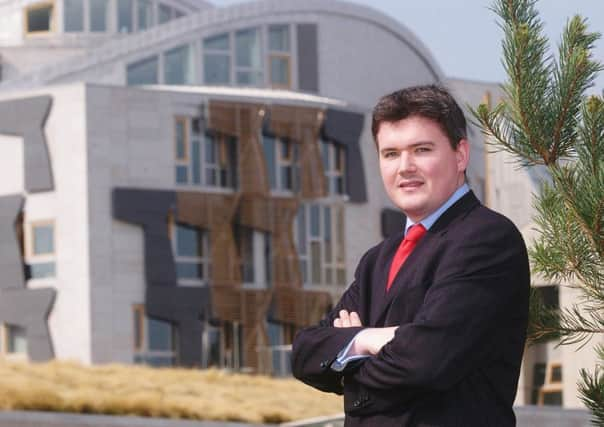Euan McColm: This time the SNP will get real


At 25, Duncan Hamilton was the youngest occupant of the Holyrood chamber; a former world debating champion, Mr Hamilton was a precociously-confident young man, tipped for greatness.
If Mr Hamilton was ever to have a rival in a future leadership contest, the obvious candidate would have been his great friend Andrew Wilson, then 28, and quickly making a name for himself as a smart, PR-savvy MSP.
Advertisement
Hide AdAdvertisement
Hide AdMr Hamilton and Mr Wilson brought considerable intellectual heft to an SNP group that was otherwise light on substance. They asked big questions about independence, proposed new routes to victory, and helped shape a different approach to campaigning in a party that had expended too much energy on negative messaging and precious little on anything positive.
For their impudence in helping turn the SNP from an ill-disciplined rabble into a party that might win elections, the pair were punished. Jealous colleagues and the petty party members under their spell briefed against Mr Hamilton and Mr Wilson. Concerted efforts were made to ensure that both ranked so low on the party’s regional lists in 2003 that they wouldn’t be re-elected.
Those with knives out for Mr Hamilton were to be denied the pleasure of using them. Before the 2003 election, he announced that he planned to leave the Scottish parliament and pursue a career in the law. These days, Mr Hamilton is a successful advocate, living happily on Last Laugh Avenue.
Mr Wilson fought a good campaign in 2003, coming within 520 votes of taking the Cumbernauld and Kilsyth seat from Labour (in those days, that was considered a cracking result for the SNP). That defeat in the constituency race coupled with his low ranking on the regional list meant he was out.
But, as is also the case with organised crime, once one gets in to politics, one is never truly ‘out’. In the years since they departed frontline politics, both Mr Hamilton and Mr Wilson have advised senior SNP figures. Former First Minister Alex Salmond sought counsel from both; Mr Wilson is currently, at Nicola Sturgeon’s behest, chairing the SNP’s growth commission, which will help shape the party’s future economic policy.
This week both Mr Hamilton and Mr Wilson have made rare personal interventions into the constitutional debate.
Speaking on a Radio 4 programme about the prospects of a second Scottish independence referendum, Mr Hamilton sounded bullish. We were now past the stage where opinion polls would dictate whether there was a second referendum, he said. He then went on to repeat the SNP’s case that the result of last year’s EU referendum meant it was “unthinkable” that a second vote on Scottish independence would not remain an option.
A few hours earlier, on Monday afternoon, Mr Wilson spoke to the media in his capacity as chairman of the growth commission. His was a fascinating contribution to the debate.
Advertisement
Hide AdAdvertisement
Hide AdThe economic case for Scottish independence should not, said Mr Wilson, include North Sea oil revenues.
This seems sensible advice: after decades during which the SNP made ‘Scotland’s oil’ a key part of their campaigning, the reality of plummeting revenues mean it’s a subject best ignored.
But Mr Wilson had more to say. Any future pro-independence campaign should balance optimism with realism. In 2014, the Yes campaign tried to persuade voters that Scotland was on the brink of becoming one of the wealthiest countries on the planet when the accounts suggested a bleaker future.
Mr Wilson is wise to suggest the nationalists adopt a more realistic tone in future. I would be surprised if the SNP did not, in a future referendum, argue that with uncertainty all around, surely it makes sense to take control of our own path through an ever-changing world.
First Minister Nicola Sturgeon has appeared confident during her interventions on the matter of the constitution since last June. But her frequently-repeated line – that the result of the EU referendum makes a second independence referendum more likely – has lost its potency; opponents have become more confident in their goading of the First Minister on the subject of another constitutional question.
There is now a tension within the SNP over the timing of a second referendum.
The swashbucklers, those who hang on the every word of former leader Alex Salmond, would like a vote to be held next autumn. They argue “if not then, when?”.
But there are those of a more cautious disposition. A popular view among a number of members of the SNP group at Holyrood is that a second referendum should be postponed until 2021 or later.
Advertisement
Hide AdAdvertisement
Hide AdIn less than a fortnight, Miss Sturgeon will address the SNP’s spring conference and expectation that she will announce something definitive on a second referendum is running high.
As she prepares to make that speech, the First Minister will doubtless be thinking over these competing ideas on the timing of another referendum. Despite the heavy spin about the increased likelihood of a return to the constitutional question, polls remain stubbornly stuck in favour of the UK. Nicola Sturgeon would be taking a considerable gamble if she were to green light indyref 2.
Perhaps Duncan Hamilton is correct and the time where polls might dictate things has passed but I suspect Nicola Sturgeon’s instincts will be to adopt the cautious approach suggested by Andrew Wilson’s work.